University Contract Law Assignment: Eddo Products Co. vs. Vestley Co.
VerifiedAdded on 2020/03/02
|12
|2918
|96
Homework Assignment
AI Summary
This assignment analyzes a contract law case involving Eddo Products Co. and Vestley Co., examining the formation of a valid contract through the exchange of communications. It delves into the concepts of offer and acceptance, determining whether a legally binding agreement was established and the specific terms involved. The assignment also explores the legal implications of exclusion clauses, particularly in relation to the Australian Consumer Law, and assesses the legal positions of parties in a scenario involving theft and negligence. Key legal principles such as the requirements for a valid offer, the impact of additional terms on acceptance, and the application of negligence laws are discussed, providing a comprehensive overview of contract law principles and their application to real-world business scenarios.
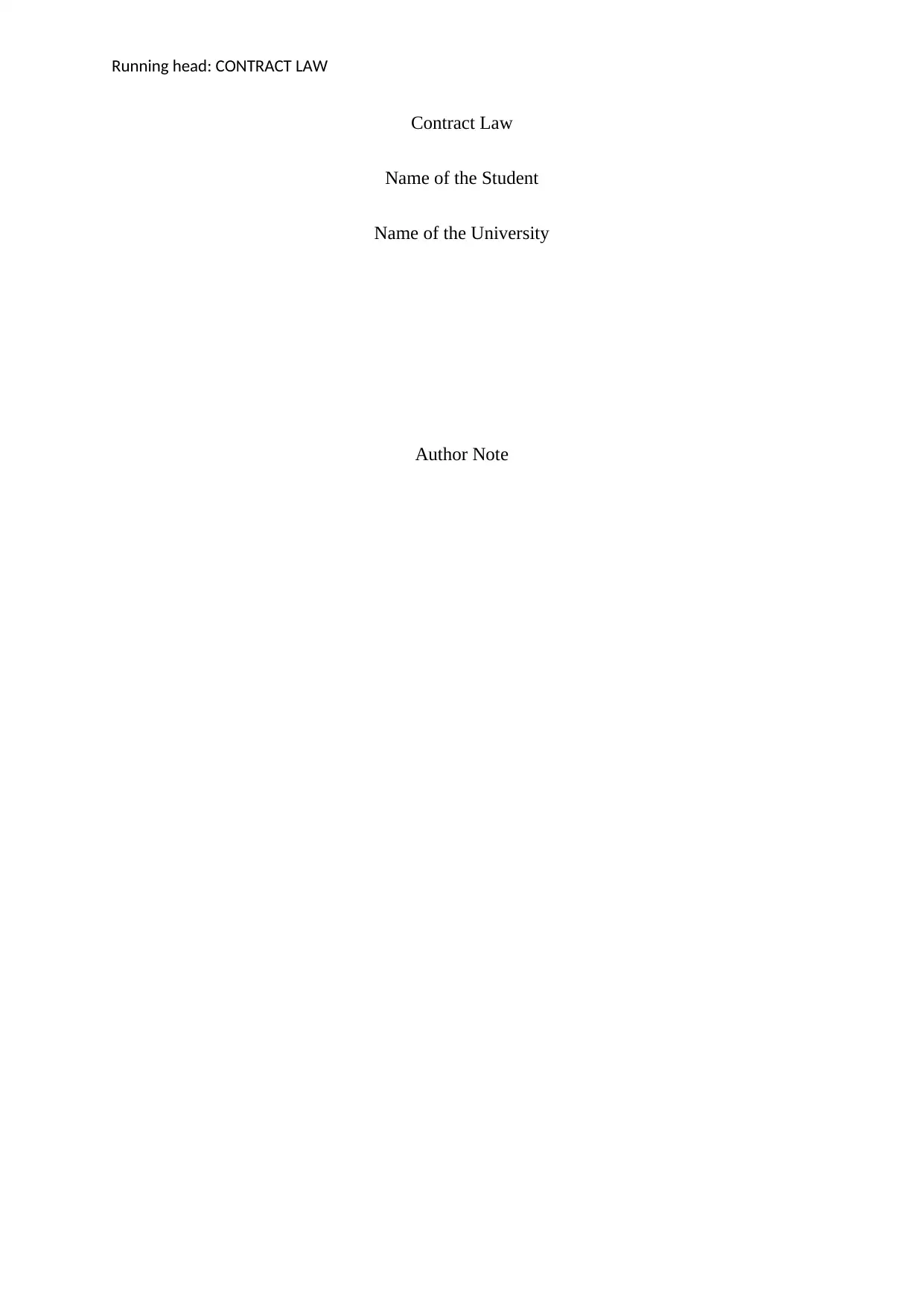
Running head: CONTRACT LAW
Contract Law
Name of the Student
Name of the University
Author Note
Contract Law
Name of the Student
Name of the University
Author Note
Paraphrase This Document
Need a fresh take? Get an instant paraphrase of this document with our AI Paraphraser
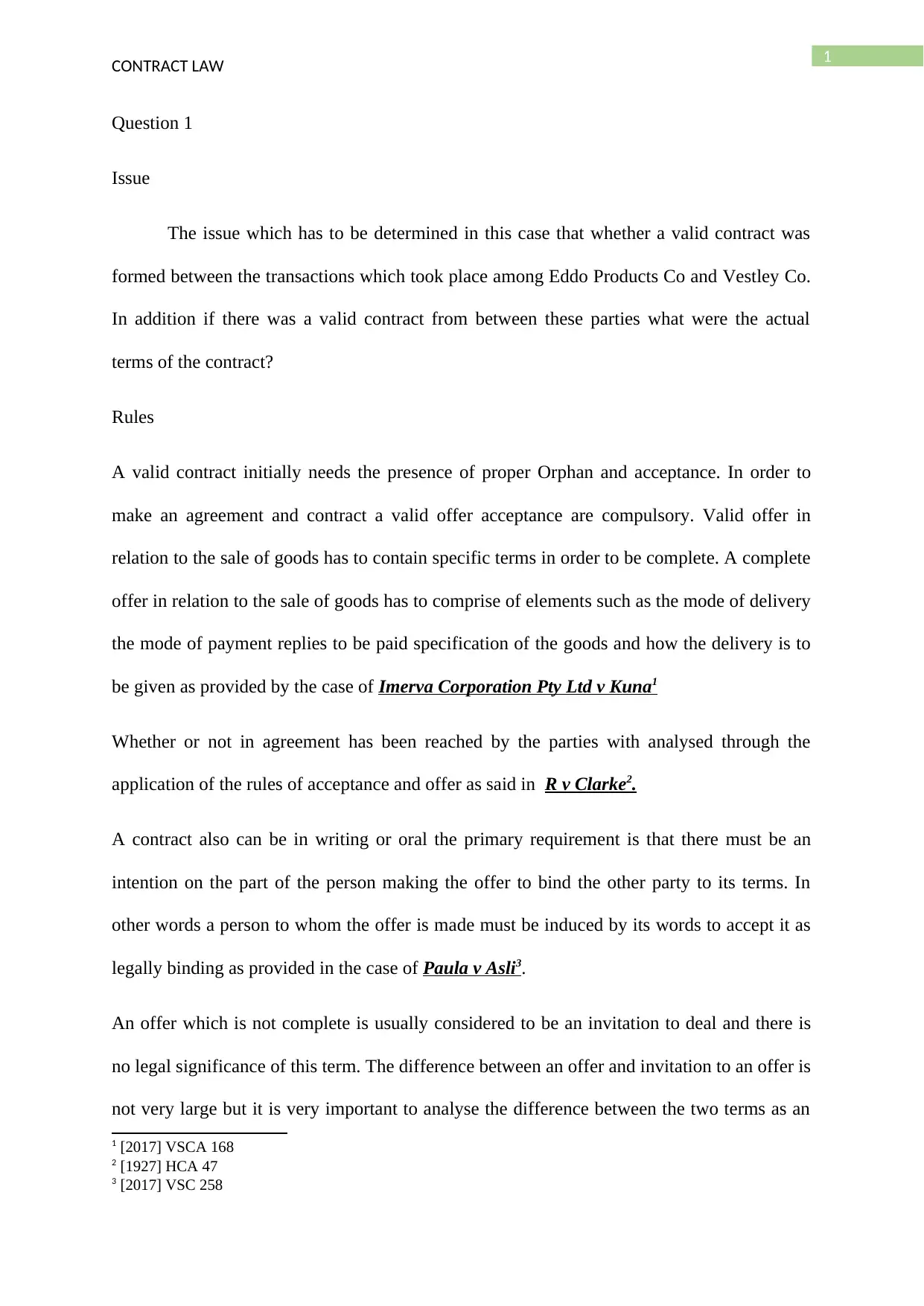
1
CONTRACT LAW
Question 1
Issue
The issue which has to be determined in this case that whether a valid contract was
formed between the transactions which took place among Eddo Products Co and Vestley Co.
In addition if there was a valid contract from between these parties what were the actual
terms of the contract?
Rules
A valid contract initially needs the presence of proper Orphan and acceptance. In order to
make an agreement and contract a valid offer acceptance are compulsory. Valid offer in
relation to the sale of goods has to contain specific terms in order to be complete. A complete
offer in relation to the sale of goods has to comprise of elements such as the mode of delivery
the mode of payment replies to be paid specification of the goods and how the delivery is to
be given as provided by the case of Imerva Corporation Pty Ltd v Kuna1
Whether or not in agreement has been reached by the parties with analysed through the
application of the rules of acceptance and offer as said in R v Clarke2.
A contract also can be in writing or oral the primary requirement is that there must be an
intention on the part of the person making the offer to bind the other party to its terms. In
other words a person to whom the offer is made must be induced by its words to accept it as
legally binding as provided in the case of Paula v Asli3.
An offer which is not complete is usually considered to be an invitation to deal and there is
no legal significance of this term. The difference between an offer and invitation to an offer is
not very large but it is very important to analyse the difference between the two terms as an
1 [2017] VSCA 168
2 [1927] HCA 47
3 [2017] VSC 258
CONTRACT LAW
Question 1
Issue
The issue which has to be determined in this case that whether a valid contract was
formed between the transactions which took place among Eddo Products Co and Vestley Co.
In addition if there was a valid contract from between these parties what were the actual
terms of the contract?
Rules
A valid contract initially needs the presence of proper Orphan and acceptance. In order to
make an agreement and contract a valid offer acceptance are compulsory. Valid offer in
relation to the sale of goods has to contain specific terms in order to be complete. A complete
offer in relation to the sale of goods has to comprise of elements such as the mode of delivery
the mode of payment replies to be paid specification of the goods and how the delivery is to
be given as provided by the case of Imerva Corporation Pty Ltd v Kuna1
Whether or not in agreement has been reached by the parties with analysed through the
application of the rules of acceptance and offer as said in R v Clarke2.
A contract also can be in writing or oral the primary requirement is that there must be an
intention on the part of the person making the offer to bind the other party to its terms. In
other words a person to whom the offer is made must be induced by its words to accept it as
legally binding as provided in the case of Paula v Asli3.
An offer which is not complete is usually considered to be an invitation to deal and there is
no legal significance of this term. The difference between an offer and invitation to an offer is
not very large but it is very important to analyse the difference between the two terms as an
1 [2017] VSCA 168
2 [1927] HCA 47
3 [2017] VSC 258
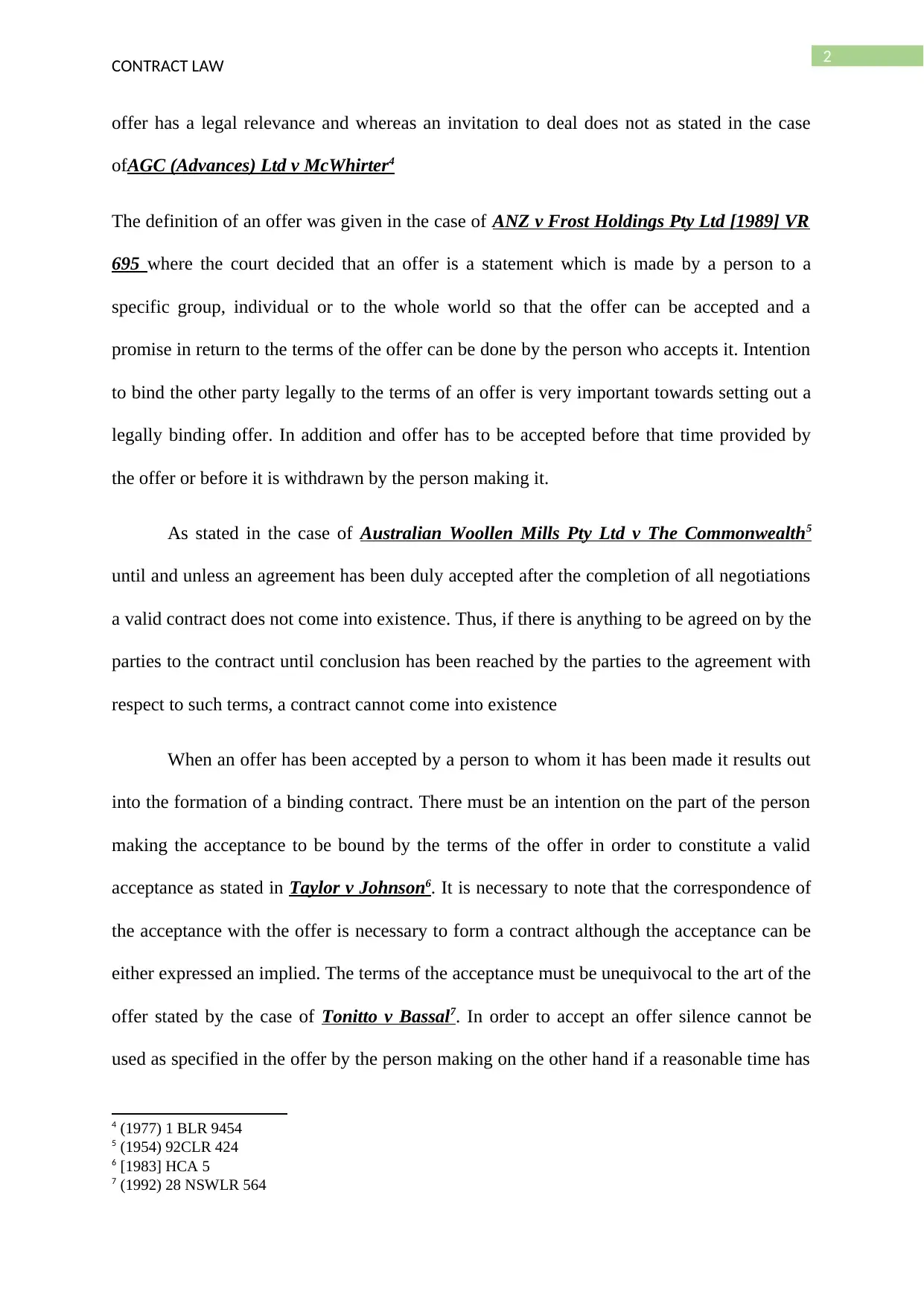
2
CONTRACT LAW
offer has a legal relevance and whereas an invitation to deal does not as stated in the case
ofAGC (Advances) Ltd v McWhirter4
The definition of an offer was given in the case of ANZ v Frost Holdings Pty Ltd [1989] VR
695 where the court decided that an offer is a statement which is made by a person to a
specific group, individual or to the whole world so that the offer can be accepted and a
promise in return to the terms of the offer can be done by the person who accepts it. Intention
to bind the other party legally to the terms of an offer is very important towards setting out a
legally binding offer. In addition and offer has to be accepted before that time provided by
the offer or before it is withdrawn by the person making it.
As stated in the case of Australian Woollen Mills Pty Ltd v The Commonwealth5
until and unless an agreement has been duly accepted after the completion of all negotiations
a valid contract does not come into existence. Thus, if there is anything to be agreed on by the
parties to the contract until conclusion has been reached by the parties to the agreement with
respect to such terms, a contract cannot come into existence
When an offer has been accepted by a person to whom it has been made it results out
into the formation of a binding contract. There must be an intention on the part of the person
making the acceptance to be bound by the terms of the offer in order to constitute a valid
acceptance as stated in Taylor v Johnson6. It is necessary to note that the correspondence of
the acceptance with the offer is necessary to form a contract although the acceptance can be
either expressed an implied. The terms of the acceptance must be unequivocal to the art of the
offer stated by the case of Tonitto v Bassal7. In order to accept an offer silence cannot be
used as specified in the offer by the person making on the other hand if a reasonable time has
4 (1977) 1 BLR 9454
5 (1954) 92CLR 424
6 [1983] HCA 5
7 (1992) 28 NSWLR 564
CONTRACT LAW
offer has a legal relevance and whereas an invitation to deal does not as stated in the case
ofAGC (Advances) Ltd v McWhirter4
The definition of an offer was given in the case of ANZ v Frost Holdings Pty Ltd [1989] VR
695 where the court decided that an offer is a statement which is made by a person to a
specific group, individual or to the whole world so that the offer can be accepted and a
promise in return to the terms of the offer can be done by the person who accepts it. Intention
to bind the other party legally to the terms of an offer is very important towards setting out a
legally binding offer. In addition and offer has to be accepted before that time provided by
the offer or before it is withdrawn by the person making it.
As stated in the case of Australian Woollen Mills Pty Ltd v The Commonwealth5
until and unless an agreement has been duly accepted after the completion of all negotiations
a valid contract does not come into existence. Thus, if there is anything to be agreed on by the
parties to the contract until conclusion has been reached by the parties to the agreement with
respect to such terms, a contract cannot come into existence
When an offer has been accepted by a person to whom it has been made it results out
into the formation of a binding contract. There must be an intention on the part of the person
making the acceptance to be bound by the terms of the offer in order to constitute a valid
acceptance as stated in Taylor v Johnson6. It is necessary to note that the correspondence of
the acceptance with the offer is necessary to form a contract although the acceptance can be
either expressed an implied. The terms of the acceptance must be unequivocal to the art of the
offer stated by the case of Tonitto v Bassal7. In order to accept an offer silence cannot be
used as specified in the offer by the person making on the other hand if a reasonable time has
4 (1977) 1 BLR 9454
5 (1954) 92CLR 424
6 [1983] HCA 5
7 (1992) 28 NSWLR 564
⊘ This is a preview!⊘
Do you want full access?
Subscribe today to unlock all pages.

Trusted by 1+ million students worldwide
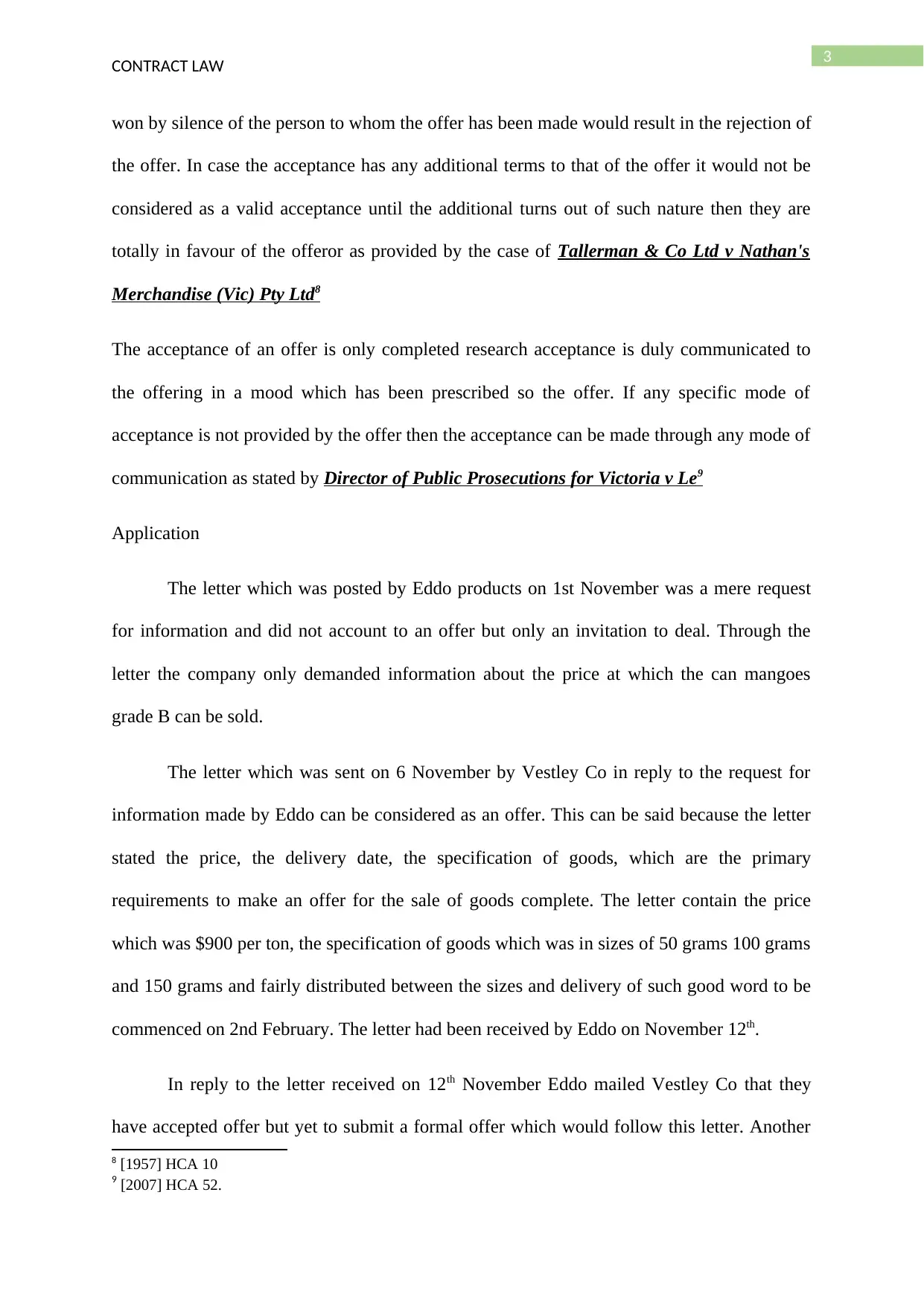
3
CONTRACT LAW
won by silence of the person to whom the offer has been made would result in the rejection of
the offer. In case the acceptance has any additional terms to that of the offer it would not be
considered as a valid acceptance until the additional turns out of such nature then they are
totally in favour of the offeror as provided by the case of Tallerman & Co Ltd v Nathan's
Merchandise (Vic) Pty Ltd8
The acceptance of an offer is only completed research acceptance is duly communicated to
the offering in a mood which has been prescribed so the offer. If any specific mode of
acceptance is not provided by the offer then the acceptance can be made through any mode of
communication as stated by Director of Public Prosecutions for Victoria v Le9
Application
The letter which was posted by Eddo products on 1st November was a mere request
for information and did not account to an offer but only an invitation to deal. Through the
letter the company only demanded information about the price at which the can mangoes
grade B can be sold.
The letter which was sent on 6 November by Vestley Co in reply to the request for
information made by Eddo can be considered as an offer. This can be said because the letter
stated the price, the delivery date, the specification of goods, which are the primary
requirements to make an offer for the sale of goods complete. The letter contain the price
which was $900 per ton, the specification of goods which was in sizes of 50 grams 100 grams
and 150 grams and fairly distributed between the sizes and delivery of such good word to be
commenced on 2nd February. The letter had been received by Eddo on November 12th.
In reply to the letter received on 12th November Eddo mailed Vestley Co that they
have accepted offer but yet to submit a formal offer which would follow this letter. Another
8 [1957] HCA 10
9 [2007] HCA 52.
CONTRACT LAW
won by silence of the person to whom the offer has been made would result in the rejection of
the offer. In case the acceptance has any additional terms to that of the offer it would not be
considered as a valid acceptance until the additional turns out of such nature then they are
totally in favour of the offeror as provided by the case of Tallerman & Co Ltd v Nathan's
Merchandise (Vic) Pty Ltd8
The acceptance of an offer is only completed research acceptance is duly communicated to
the offering in a mood which has been prescribed so the offer. If any specific mode of
acceptance is not provided by the offer then the acceptance can be made through any mode of
communication as stated by Director of Public Prosecutions for Victoria v Le9
Application
The letter which was posted by Eddo products on 1st November was a mere request
for information and did not account to an offer but only an invitation to deal. Through the
letter the company only demanded information about the price at which the can mangoes
grade B can be sold.
The letter which was sent on 6 November by Vestley Co in reply to the request for
information made by Eddo can be considered as an offer. This can be said because the letter
stated the price, the delivery date, the specification of goods, which are the primary
requirements to make an offer for the sale of goods complete. The letter contain the price
which was $900 per ton, the specification of goods which was in sizes of 50 grams 100 grams
and 150 grams and fairly distributed between the sizes and delivery of such good word to be
commenced on 2nd February. The letter had been received by Eddo on November 12th.
In reply to the letter received on 12th November Eddo mailed Vestley Co that they
have accepted offer but yet to submit a formal offer which would follow this letter. Another
8 [1957] HCA 10
9 [2007] HCA 52.
Paraphrase This Document
Need a fresh take? Get an instant paraphrase of this document with our AI Paraphraser
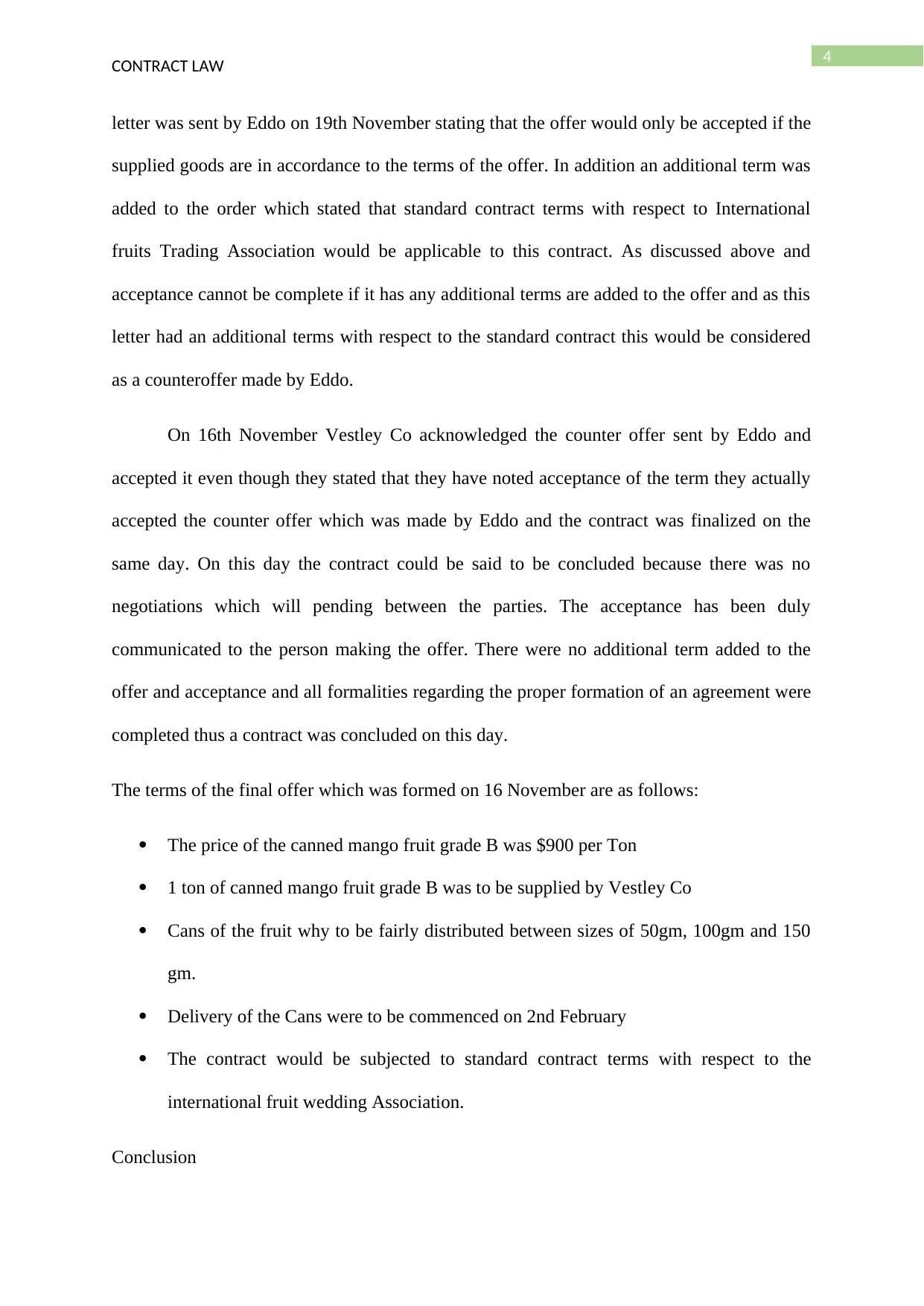
4
CONTRACT LAW
letter was sent by Eddo on 19th November stating that the offer would only be accepted if the
supplied goods are in accordance to the terms of the offer. In addition an additional term was
added to the order which stated that standard contract terms with respect to International
fruits Trading Association would be applicable to this contract. As discussed above and
acceptance cannot be complete if it has any additional terms are added to the offer and as this
letter had an additional terms with respect to the standard contract this would be considered
as a counteroffer made by Eddo.
On 16th November Vestley Co acknowledged the counter offer sent by Eddo and
accepted it even though they stated that they have noted acceptance of the term they actually
accepted the counter offer which was made by Eddo and the contract was finalized on the
same day. On this day the contract could be said to be concluded because there was no
negotiations which will pending between the parties. The acceptance has been duly
communicated to the person making the offer. There were no additional term added to the
offer and acceptance and all formalities regarding the proper formation of an agreement were
completed thus a contract was concluded on this day.
The terms of the final offer which was formed on 16 November are as follows:
The price of the canned mango fruit grade B was $900 per Ton
1 ton of canned mango fruit grade B was to be supplied by Vestley Co
Cans of the fruit why to be fairly distributed between sizes of 50gm, 100gm and 150
gm.
Delivery of the Cans were to be commenced on 2nd February
The contract would be subjected to standard contract terms with respect to the
international fruit wedding Association.
Conclusion
CONTRACT LAW
letter was sent by Eddo on 19th November stating that the offer would only be accepted if the
supplied goods are in accordance to the terms of the offer. In addition an additional term was
added to the order which stated that standard contract terms with respect to International
fruits Trading Association would be applicable to this contract. As discussed above and
acceptance cannot be complete if it has any additional terms are added to the offer and as this
letter had an additional terms with respect to the standard contract this would be considered
as a counteroffer made by Eddo.
On 16th November Vestley Co acknowledged the counter offer sent by Eddo and
accepted it even though they stated that they have noted acceptance of the term they actually
accepted the counter offer which was made by Eddo and the contract was finalized on the
same day. On this day the contract could be said to be concluded because there was no
negotiations which will pending between the parties. The acceptance has been duly
communicated to the person making the offer. There were no additional term added to the
offer and acceptance and all formalities regarding the proper formation of an agreement were
completed thus a contract was concluded on this day.
The terms of the final offer which was formed on 16 November are as follows:
The price of the canned mango fruit grade B was $900 per Ton
1 ton of canned mango fruit grade B was to be supplied by Vestley Co
Cans of the fruit why to be fairly distributed between sizes of 50gm, 100gm and 150
gm.
Delivery of the Cans were to be commenced on 2nd February
The contract would be subjected to standard contract terms with respect to the
international fruit wedding Association.
Conclusion
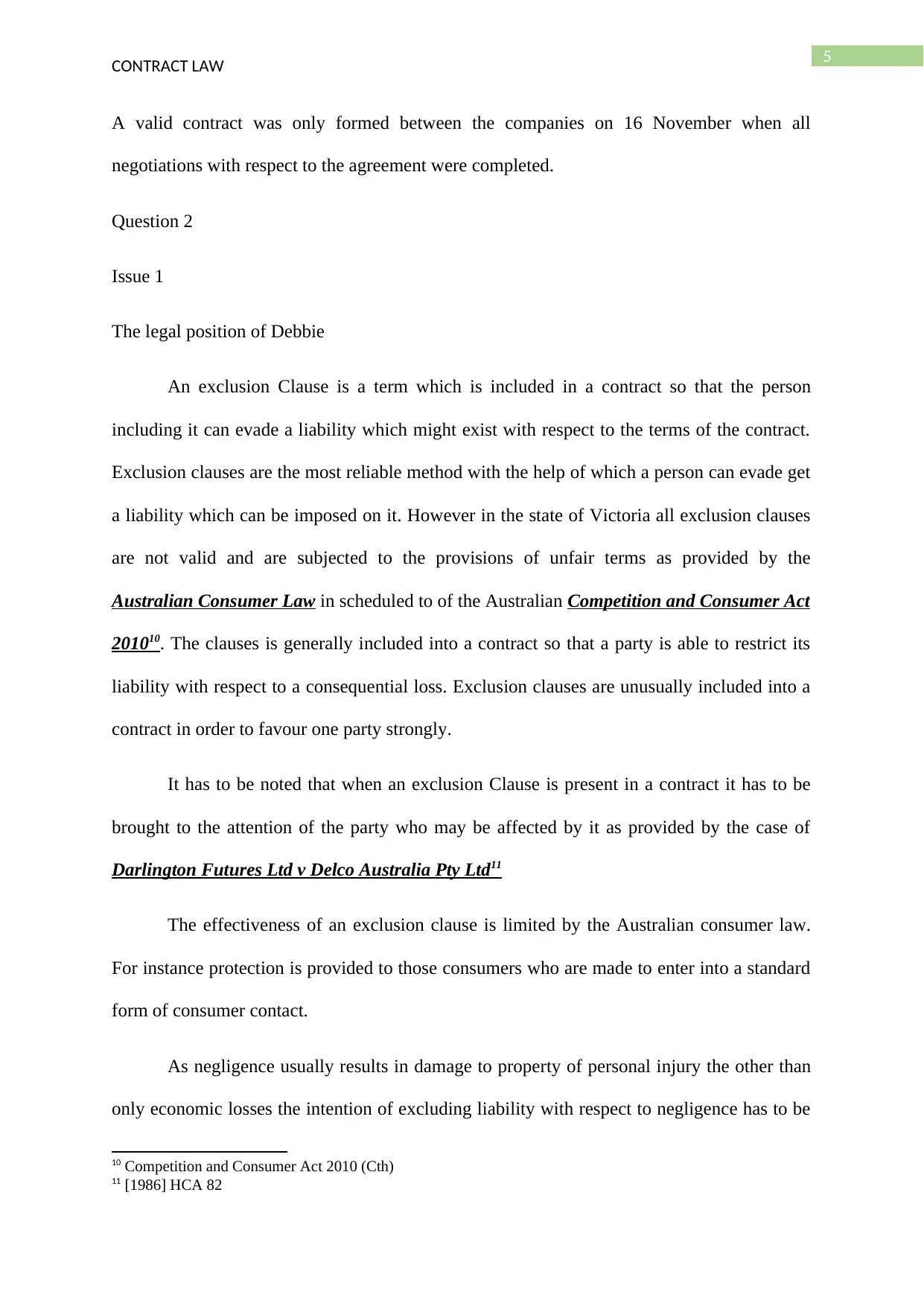
5
CONTRACT LAW
A valid contract was only formed between the companies on 16 November when all
negotiations with respect to the agreement were completed.
Question 2
Issue 1
The legal position of Debbie
An exclusion Clause is a term which is included in a contract so that the person
including it can evade a liability which might exist with respect to the terms of the contract.
Exclusion clauses are the most reliable method with the help of which a person can evade get
a liability which can be imposed on it. However in the state of Victoria all exclusion clauses
are not valid and are subjected to the provisions of unfair terms as provided by the
Australian Consumer Law in scheduled to of the Australian Competition and Consumer Act
201010. The clauses is generally included into a contract so that a party is able to restrict its
liability with respect to a consequential loss. Exclusion clauses are unusually included into a
contract in order to favour one party strongly.
It has to be noted that when an exclusion Clause is present in a contract it has to be
brought to the attention of the party who may be affected by it as provided by the case of
Darlington Futures Ltd v Delco Australia Pty Ltd11
The effectiveness of an exclusion clause is limited by the Australian consumer law.
For instance protection is provided to those consumers who are made to enter into a standard
form of consumer contact.
As negligence usually results in damage to property of personal injury the other than
only economic losses the intention of excluding liability with respect to negligence has to be
10 Competition and Consumer Act 2010 (Cth)
11 [1986] HCA 82
CONTRACT LAW
A valid contract was only formed between the companies on 16 November when all
negotiations with respect to the agreement were completed.
Question 2
Issue 1
The legal position of Debbie
An exclusion Clause is a term which is included in a contract so that the person
including it can evade a liability which might exist with respect to the terms of the contract.
Exclusion clauses are the most reliable method with the help of which a person can evade get
a liability which can be imposed on it. However in the state of Victoria all exclusion clauses
are not valid and are subjected to the provisions of unfair terms as provided by the
Australian Consumer Law in scheduled to of the Australian Competition and Consumer Act
201010. The clauses is generally included into a contract so that a party is able to restrict its
liability with respect to a consequential loss. Exclusion clauses are unusually included into a
contract in order to favour one party strongly.
It has to be noted that when an exclusion Clause is present in a contract it has to be
brought to the attention of the party who may be affected by it as provided by the case of
Darlington Futures Ltd v Delco Australia Pty Ltd11
The effectiveness of an exclusion clause is limited by the Australian consumer law.
For instance protection is provided to those consumers who are made to enter into a standard
form of consumer contact.
As negligence usually results in damage to property of personal injury the other than
only economic losses the intention of excluding liability with respect to negligence has to be
10 Competition and Consumer Act 2010 (Cth)
11 [1986] HCA 82
⊘ This is a preview!⊘
Do you want full access?
Subscribe today to unlock all pages.

Trusted by 1+ million students worldwide
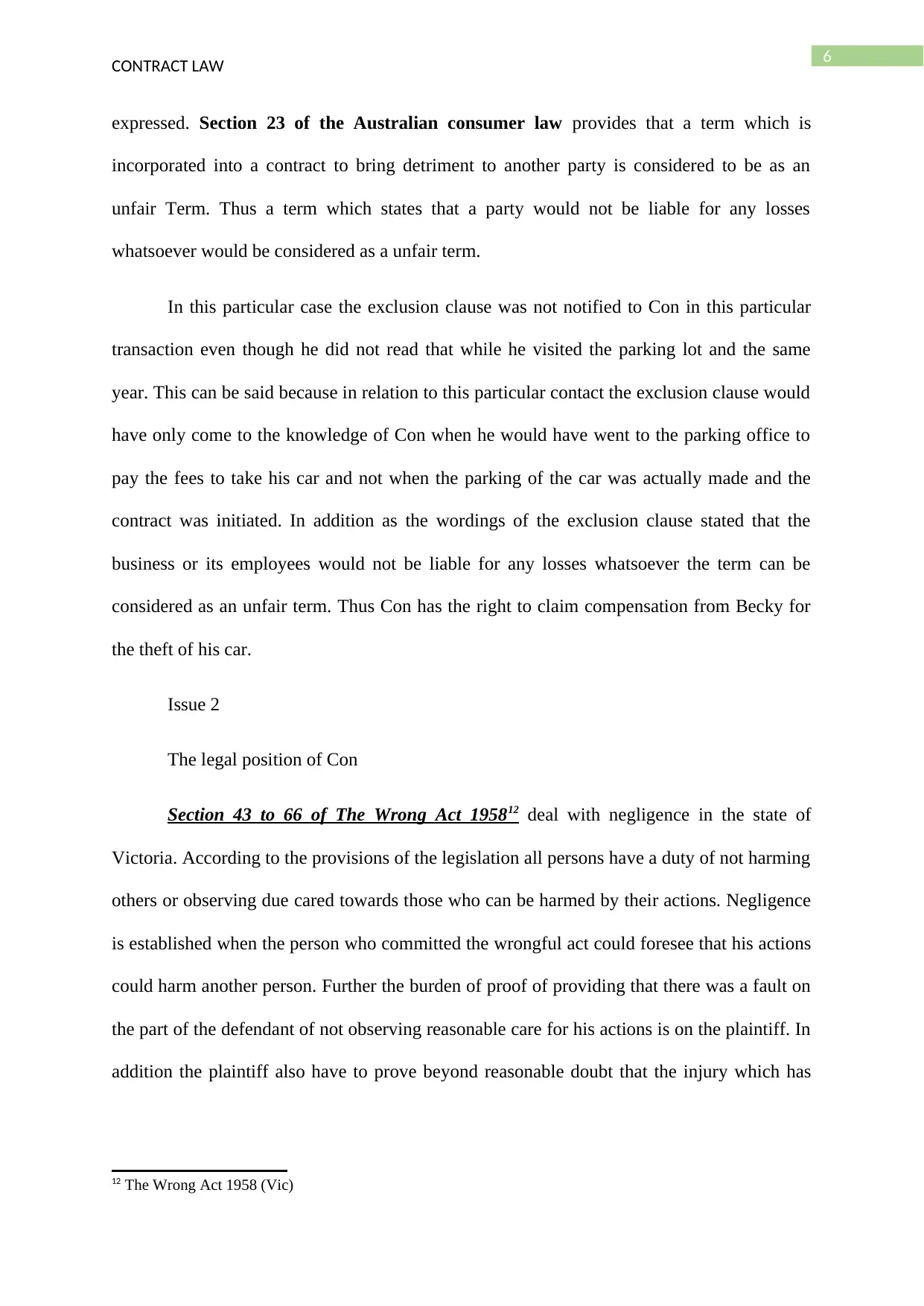
6
CONTRACT LAW
expressed. Section 23 of the Australian consumer law provides that a term which is
incorporated into a contract to bring detriment to another party is considered to be as an
unfair Term. Thus a term which states that a party would not be liable for any losses
whatsoever would be considered as a unfair term.
In this particular case the exclusion clause was not notified to Con in this particular
transaction even though he did not read that while he visited the parking lot and the same
year. This can be said because in relation to this particular contact the exclusion clause would
have only come to the knowledge of Con when he would have went to the parking office to
pay the fees to take his car and not when the parking of the car was actually made and the
contract was initiated. In addition as the wordings of the exclusion clause stated that the
business or its employees would not be liable for any losses whatsoever the term can be
considered as an unfair term. Thus Con has the right to claim compensation from Becky for
the theft of his car.
Issue 2
The legal position of Con
Section 43 to 66 of The Wrong Act 195812 deal with negligence in the state of
Victoria. According to the provisions of the legislation all persons have a duty of not harming
others or observing due cared towards those who can be harmed by their actions. Negligence
is established when the person who committed the wrongful act could foresee that his actions
could harm another person. Further the burden of proof of providing that there was a fault on
the part of the defendant of not observing reasonable care for his actions is on the plaintiff. In
addition the plaintiff also have to prove beyond reasonable doubt that the injury which has
12 The Wrong Act 1958 (Vic)
CONTRACT LAW
expressed. Section 23 of the Australian consumer law provides that a term which is
incorporated into a contract to bring detriment to another party is considered to be as an
unfair Term. Thus a term which states that a party would not be liable for any losses
whatsoever would be considered as a unfair term.
In this particular case the exclusion clause was not notified to Con in this particular
transaction even though he did not read that while he visited the parking lot and the same
year. This can be said because in relation to this particular contact the exclusion clause would
have only come to the knowledge of Con when he would have went to the parking office to
pay the fees to take his car and not when the parking of the car was actually made and the
contract was initiated. In addition as the wordings of the exclusion clause stated that the
business or its employees would not be liable for any losses whatsoever the term can be
considered as an unfair term. Thus Con has the right to claim compensation from Becky for
the theft of his car.
Issue 2
The legal position of Con
Section 43 to 66 of The Wrong Act 195812 deal with negligence in the state of
Victoria. According to the provisions of the legislation all persons have a duty of not harming
others or observing due cared towards those who can be harmed by their actions. Negligence
is established when the person who committed the wrongful act could foresee that his actions
could harm another person. Further the burden of proof of providing that there was a fault on
the part of the defendant of not observing reasonable care for his actions is on the plaintiff. In
addition the plaintiff also have to prove beyond reasonable doubt that the injury which has
12 The Wrong Act 1958 (Vic)
Paraphrase This Document
Need a fresh take? Get an instant paraphrase of this document with our AI Paraphraser
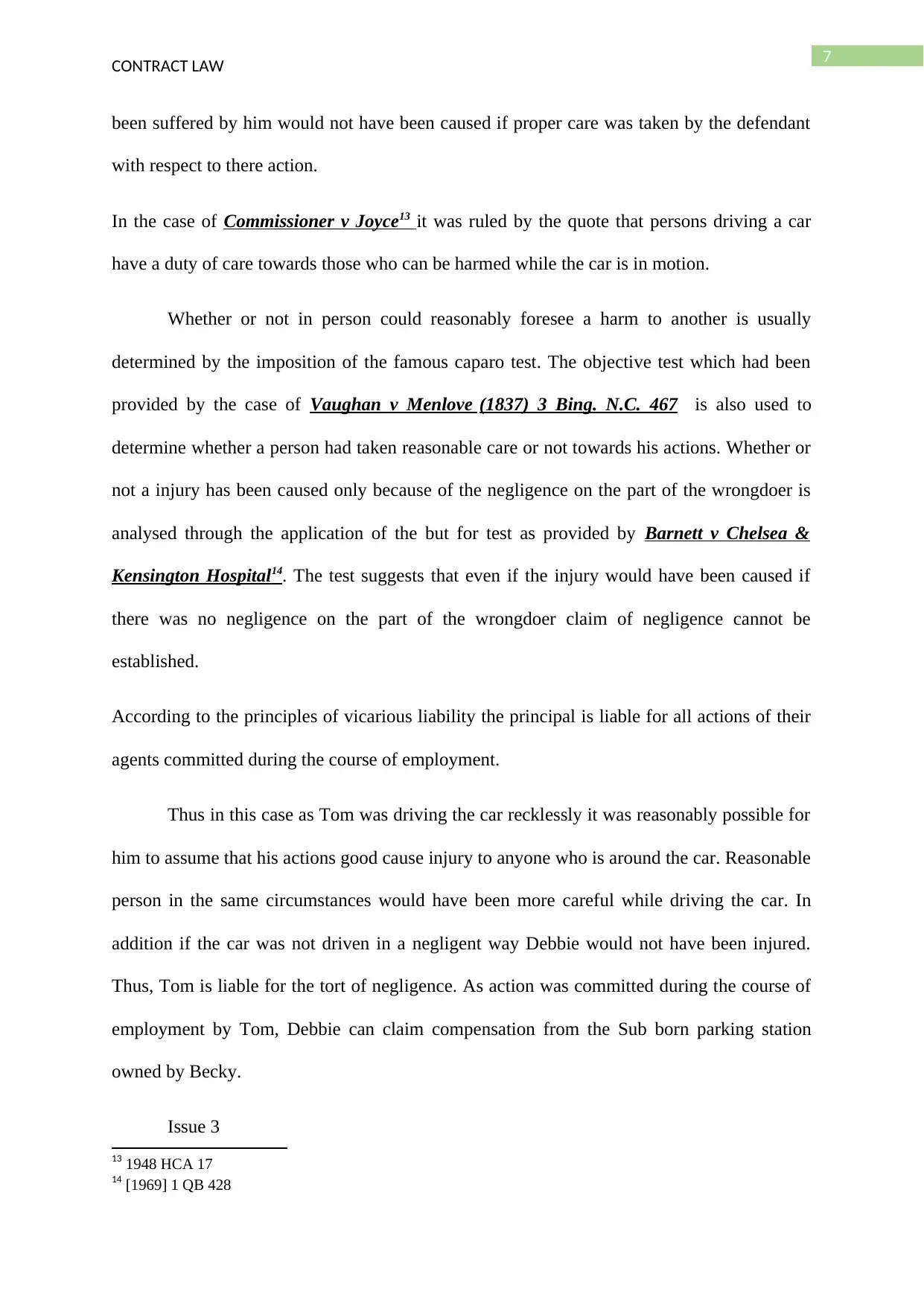
7
CONTRACT LAW
been suffered by him would not have been caused if proper care was taken by the defendant
with respect to there action.
In the case of Commissioner v Joyce13 it was ruled by the quote that persons driving a car
have a duty of care towards those who can be harmed while the car is in motion.
Whether or not in person could reasonably foresee a harm to another is usually
determined by the imposition of the famous caparo test. The objective test which had been
provided by the case of Vaughan v Menlove (1837) 3 Bing. N.C. 467 is also used to
determine whether a person had taken reasonable care or not towards his actions. Whether or
not a injury has been caused only because of the negligence on the part of the wrongdoer is
analysed through the application of the but for test as provided by Barnett v Chelsea &
Kensington Hospital14. The test suggests that even if the injury would have been caused if
there was no negligence on the part of the wrongdoer claim of negligence cannot be
established.
According to the principles of vicarious liability the principal is liable for all actions of their
agents committed during the course of employment.
Thus in this case as Tom was driving the car recklessly it was reasonably possible for
him to assume that his actions good cause injury to anyone who is around the car. Reasonable
person in the same circumstances would have been more careful while driving the car. In
addition if the car was not driven in a negligent way Debbie would not have been injured.
Thus, Tom is liable for the tort of negligence. As action was committed during the course of
employment by Tom, Debbie can claim compensation from the Sub born parking station
owned by Becky.
Issue 3
13 1948 HCA 17
14 [1969] 1 QB 428
CONTRACT LAW
been suffered by him would not have been caused if proper care was taken by the defendant
with respect to there action.
In the case of Commissioner v Joyce13 it was ruled by the quote that persons driving a car
have a duty of care towards those who can be harmed while the car is in motion.
Whether or not in person could reasonably foresee a harm to another is usually
determined by the imposition of the famous caparo test. The objective test which had been
provided by the case of Vaughan v Menlove (1837) 3 Bing. N.C. 467 is also used to
determine whether a person had taken reasonable care or not towards his actions. Whether or
not a injury has been caused only because of the negligence on the part of the wrongdoer is
analysed through the application of the but for test as provided by Barnett v Chelsea &
Kensington Hospital14. The test suggests that even if the injury would have been caused if
there was no negligence on the part of the wrongdoer claim of negligence cannot be
established.
According to the principles of vicarious liability the principal is liable for all actions of their
agents committed during the course of employment.
Thus in this case as Tom was driving the car recklessly it was reasonably possible for
him to assume that his actions good cause injury to anyone who is around the car. Reasonable
person in the same circumstances would have been more careful while driving the car. In
addition if the car was not driven in a negligent way Debbie would not have been injured.
Thus, Tom is liable for the tort of negligence. As action was committed during the course of
employment by Tom, Debbie can claim compensation from the Sub born parking station
owned by Becky.
Issue 3
13 1948 HCA 17
14 [1969] 1 QB 428
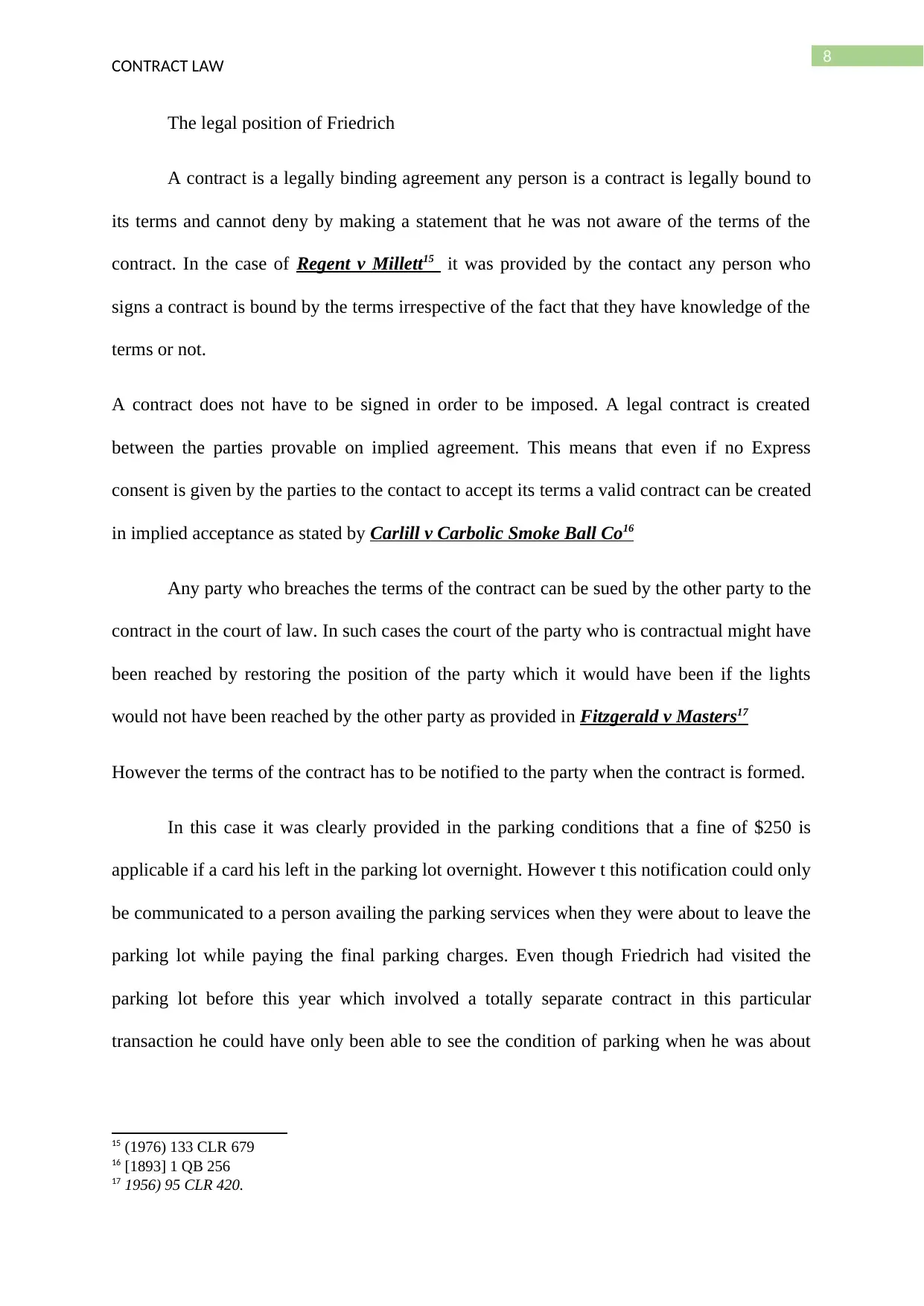
8
CONTRACT LAW
The legal position of Friedrich
A contract is a legally binding agreement any person is a contract is legally bound to
its terms and cannot deny by making a statement that he was not aware of the terms of the
contract. In the case of Regent v Millett15 it was provided by the contact any person who
signs a contract is bound by the terms irrespective of the fact that they have knowledge of the
terms or not.
A contract does not have to be signed in order to be imposed. A legal contract is created
between the parties provable on implied agreement. This means that even if no Express
consent is given by the parties to the contact to accept its terms a valid contract can be created
in implied acceptance as stated by Carlill v Carbolic Smoke Ball Co16
Any party who breaches the terms of the contract can be sued by the other party to the
contract in the court of law. In such cases the court of the party who is contractual might have
been reached by restoring the position of the party which it would have been if the lights
would not have been reached by the other party as provided in Fitzgerald v Masters17
However the terms of the contract has to be notified to the party when the contract is formed.
In this case it was clearly provided in the parking conditions that a fine of $250 is
applicable if a card his left in the parking lot overnight. However t this notification could only
be communicated to a person availing the parking services when they were about to leave the
parking lot while paying the final parking charges. Even though Friedrich had visited the
parking lot before this year which involved a totally separate contract in this particular
transaction he could have only been able to see the condition of parking when he was about
15 (1976) 133 CLR 679
16 [1893] 1 QB 256
17 1956) 95 CLR 420.
CONTRACT LAW
The legal position of Friedrich
A contract is a legally binding agreement any person is a contract is legally bound to
its terms and cannot deny by making a statement that he was not aware of the terms of the
contract. In the case of Regent v Millett15 it was provided by the contact any person who
signs a contract is bound by the terms irrespective of the fact that they have knowledge of the
terms or not.
A contract does not have to be signed in order to be imposed. A legal contract is created
between the parties provable on implied agreement. This means that even if no Express
consent is given by the parties to the contact to accept its terms a valid contract can be created
in implied acceptance as stated by Carlill v Carbolic Smoke Ball Co16
Any party who breaches the terms of the contract can be sued by the other party to the
contract in the court of law. In such cases the court of the party who is contractual might have
been reached by restoring the position of the party which it would have been if the lights
would not have been reached by the other party as provided in Fitzgerald v Masters17
However the terms of the contract has to be notified to the party when the contract is formed.
In this case it was clearly provided in the parking conditions that a fine of $250 is
applicable if a card his left in the parking lot overnight. However t this notification could only
be communicated to a person availing the parking services when they were about to leave the
parking lot while paying the final parking charges. Even though Friedrich had visited the
parking lot before this year which involved a totally separate contract in this particular
transaction he could have only been able to see the condition of parking when he was about
15 (1976) 133 CLR 679
16 [1893] 1 QB 256
17 1956) 95 CLR 420.
⊘ This is a preview!⊘
Do you want full access?
Subscribe today to unlock all pages.

Trusted by 1+ million students worldwide
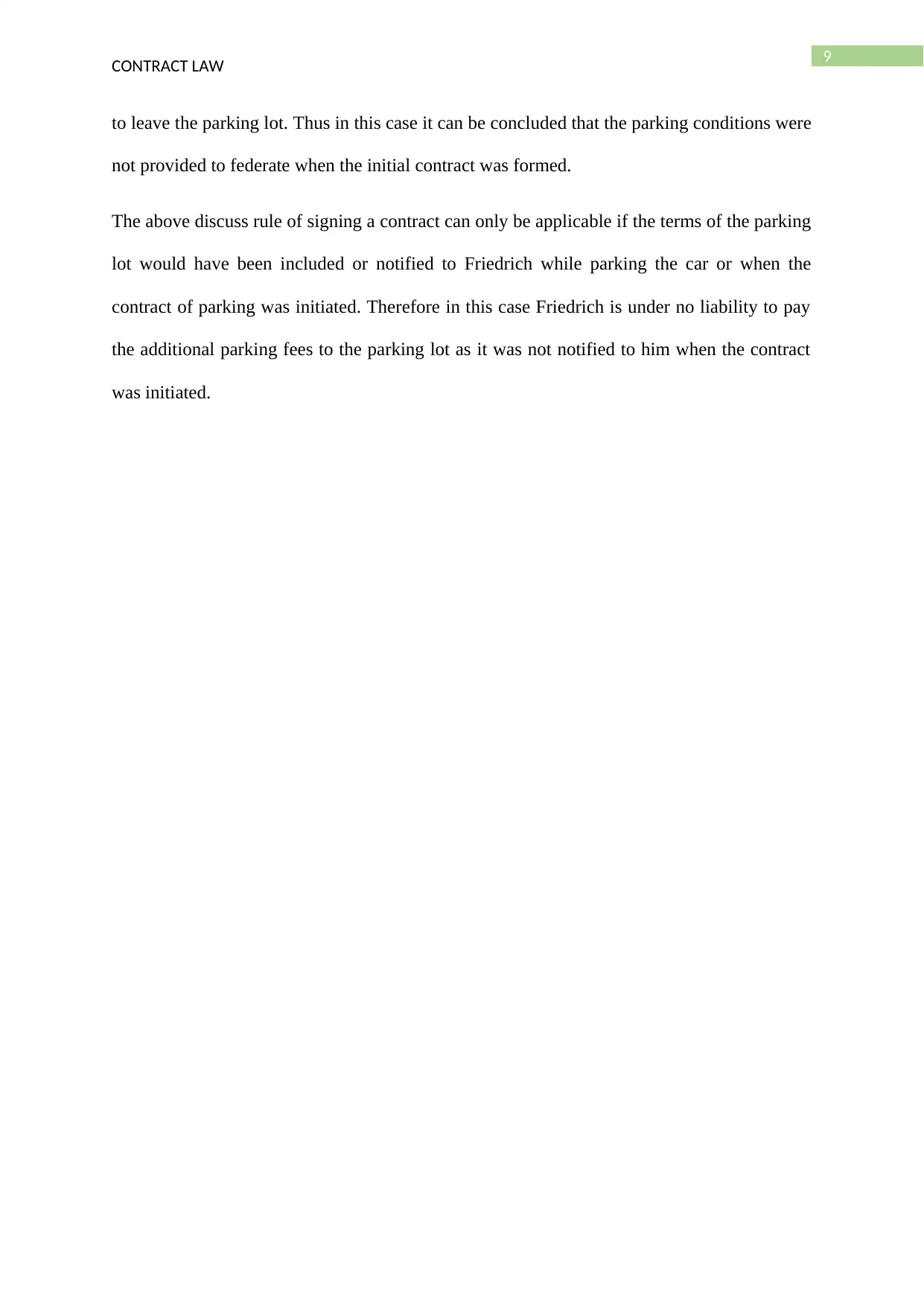
9
CONTRACT LAW
to leave the parking lot. Thus in this case it can be concluded that the parking conditions were
not provided to federate when the initial contract was formed.
The above discuss rule of signing a contract can only be applicable if the terms of the parking
lot would have been included or notified to Friedrich while parking the car or when the
contract of parking was initiated. Therefore in this case Friedrich is under no liability to pay
the additional parking fees to the parking lot as it was not notified to him when the contract
was initiated.
CONTRACT LAW
to leave the parking lot. Thus in this case it can be concluded that the parking conditions were
not provided to federate when the initial contract was formed.
The above discuss rule of signing a contract can only be applicable if the terms of the parking
lot would have been included or notified to Friedrich while parking the car or when the
contract of parking was initiated. Therefore in this case Friedrich is under no liability to pay
the additional parking fees to the parking lot as it was not notified to him when the contract
was initiated.
Paraphrase This Document
Need a fresh take? Get an instant paraphrase of this document with our AI Paraphraser
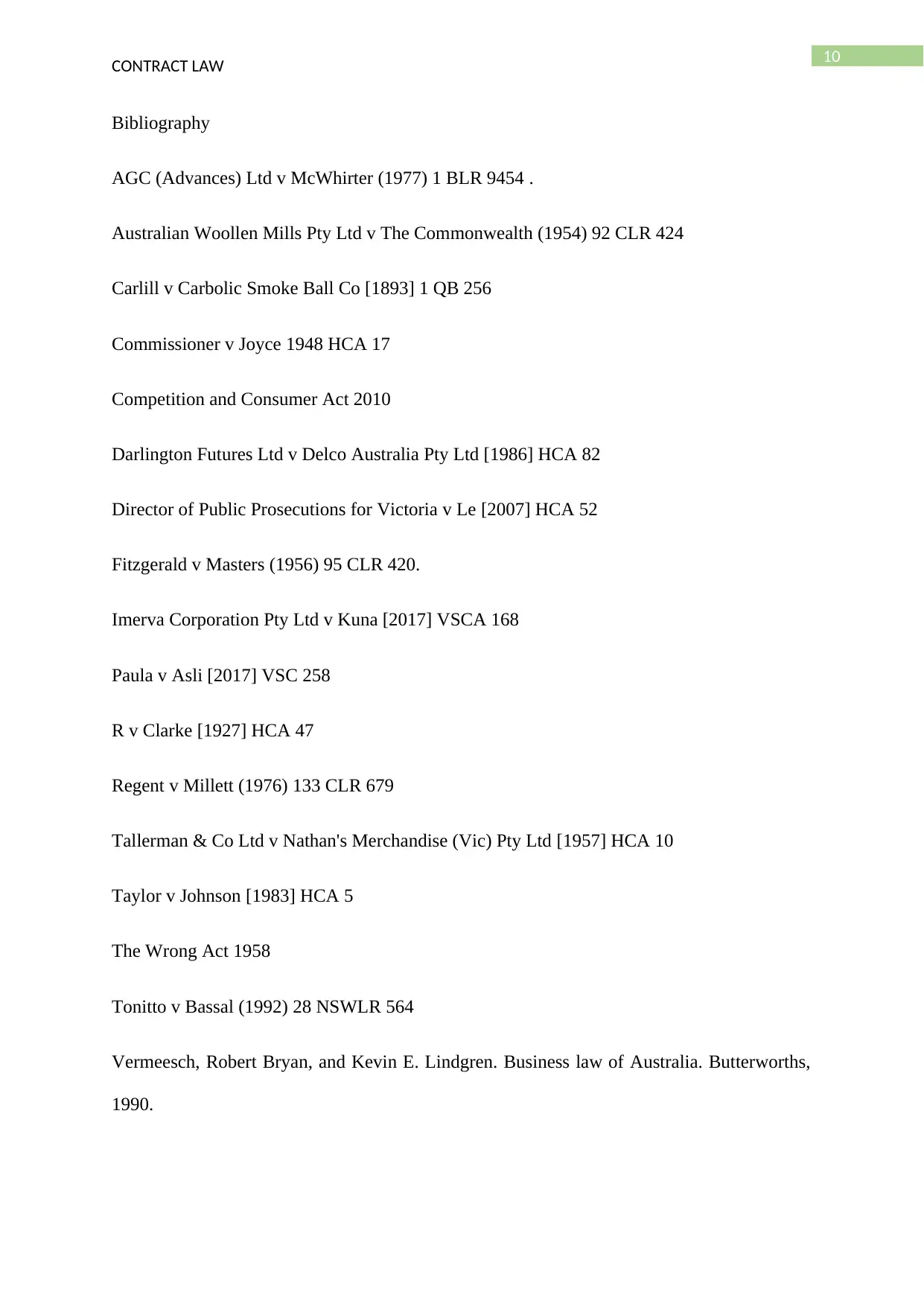
10
CONTRACT LAW
Bibliography
AGC (Advances) Ltd v McWhirter (1977) 1 BLR 9454 .
Australian Woollen Mills Pty Ltd v The Commonwealth (1954) 92 CLR 424
Carlill v Carbolic Smoke Ball Co [1893] 1 QB 256
Commissioner v Joyce 1948 HCA 17
Competition and Consumer Act 2010
Darlington Futures Ltd v Delco Australia Pty Ltd [1986] HCA 82
Director of Public Prosecutions for Victoria v Le [2007] HCA 52
Fitzgerald v Masters (1956) 95 CLR 420.
Imerva Corporation Pty Ltd v Kuna [2017] VSCA 168
Paula v Asli [2017] VSC 258
R v Clarke [1927] HCA 47
Regent v Millett (1976) 133 CLR 679
Tallerman & Co Ltd v Nathan's Merchandise (Vic) Pty Ltd [1957] HCA 10
Taylor v Johnson [1983] HCA 5
The Wrong Act 1958
Tonitto v Bassal (1992) 28 NSWLR 564
Vermeesch, Robert Bryan, and Kevin E. Lindgren. Business law of Australia. Butterworths,
1990.
CONTRACT LAW
Bibliography
AGC (Advances) Ltd v McWhirter (1977) 1 BLR 9454 .
Australian Woollen Mills Pty Ltd v The Commonwealth (1954) 92 CLR 424
Carlill v Carbolic Smoke Ball Co [1893] 1 QB 256
Commissioner v Joyce 1948 HCA 17
Competition and Consumer Act 2010
Darlington Futures Ltd v Delco Australia Pty Ltd [1986] HCA 82
Director of Public Prosecutions for Victoria v Le [2007] HCA 52
Fitzgerald v Masters (1956) 95 CLR 420.
Imerva Corporation Pty Ltd v Kuna [2017] VSCA 168
Paula v Asli [2017] VSC 258
R v Clarke [1927] HCA 47
Regent v Millett (1976) 133 CLR 679
Tallerman & Co Ltd v Nathan's Merchandise (Vic) Pty Ltd [1957] HCA 10
Taylor v Johnson [1983] HCA 5
The Wrong Act 1958
Tonitto v Bassal (1992) 28 NSWLR 564
Vermeesch, Robert Bryan, and Kevin E. Lindgren. Business law of Australia. Butterworths,
1990.

11
CONTRACT LAW
CONTRACT LAW
⊘ This is a preview!⊘
Do you want full access?
Subscribe today to unlock all pages.

Trusted by 1+ million students worldwide
1 out of 12
Related Documents
Your All-in-One AI-Powered Toolkit for Academic Success.
+13062052269
info@desklib.com
Available 24*7 on WhatsApp / Email
![[object Object]](/_next/static/media/star-bottom.7253800d.svg)
Unlock your academic potential
Copyright © 2020–2026 A2Z Services. All Rights Reserved. Developed and managed by ZUCOL.





